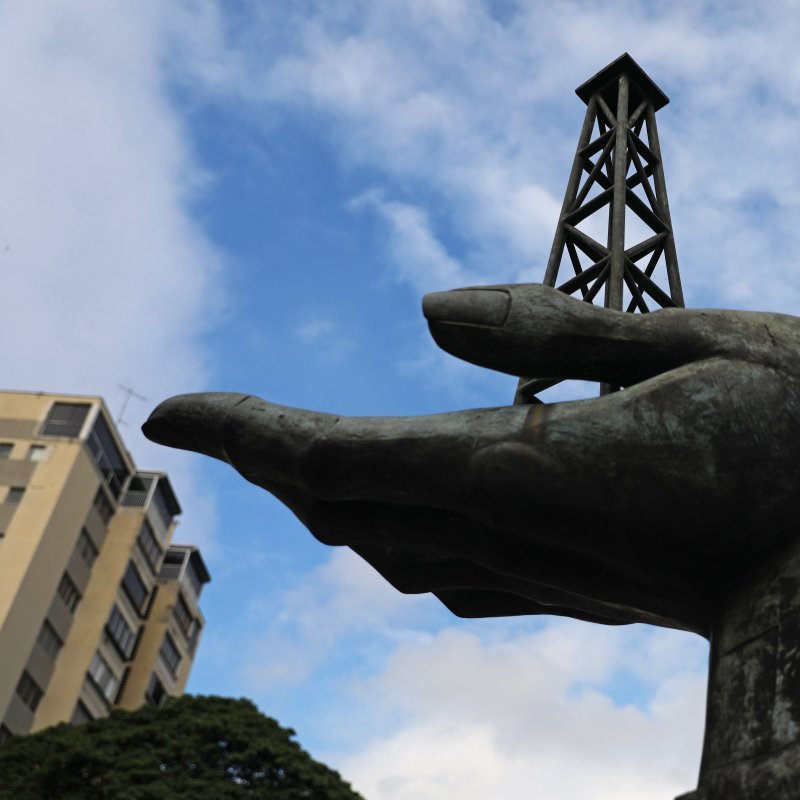According to an IEA report, world markets will soon see dislocation related to U.S. sanctions against Venezuela, but also a make quick adjustment in terms of volume. Pictured, the headquarters of Venezuela's state oil company, PDVSA. Photo by Miguel Gutierrez/EPA-EFE
Feb. 14 (UPI) -- The Paris-based International Energy Agency said that in terms of crude oil quantity, markets will adjust after initial dislocations related to U.S. sanctions on Venezuela.
"The sanctions are already making it difficult for PDVSA to export oil. Even so, headline benchmark crude oil prices have hardly changed on news of the sanctions," the IEA said Wednesday.
Stocks in most markets are currently ample, and there is spare capacity with OPEC-related cuts being implemented. OPEC, and some non-OPEC partners, mainly Russia, announced on Dec. 7 plans to remove 1.2 million barrels of crude oil per day starting this year to help support higher price levels.
"Crude oil quality is another issue, and, in the wider context of supply in the early part of 2019, it is even more important," the IEA said. Venezuela's heavy sour crude is relatively similar to some other heavier grades that have their own supply disruptions, like from Iran or Alberta, Canada.
PDVSA, Venezuela's state-owned oil company, will have bigger problems as it will be short of the lighter grades and, because of the sanctions, unable to import significant quantities of dilutents for domestic blending.
PDVSA needs to find a buyer to replace the 450,000 barrels per day that were exported to the United States in 2018, mainly to its North American subsidiary Citgo.
India is one possibility. Venezuela sold 360,000 barrels there in 2017, though it had an 11 percent drop last year, the IEA said.
Venezuela also ships crude to China just to pay for debt.
"There are no signs that other producers, e.g. Saudi Arabia, are intending to push more barrels into the market. Prices have not increased alarmingly because the market is still working off the surpluses built up in the second half of 2018," the IEA said.
At the time, "global supply is estimated to have exceeded demand by 1.3 million barrels per day," the Paris-based organization said.
"In 2019, the U.S. alone will grow its crude oil production by more than Venezuela's current output," the IEA said. However, the impact of the reduction of heavier crudes would mean higher costs for refiners, it added.
The IEA was set up by a group of western nations in a bid to gather information about energy markets, in work to counter similar energy market analysis efforts by crude producers.
In other news related to Venezuela, Russia's Energy Minister Alexander Novak said Thursday that the U.S. sanctions against Venezuela are bringing uncertainty and affecting prices.
"That uncertainty has an impact on the market, of course. The market responds to that," Novak said, as quoted by Russian news agency Tass.
The U.S. sanctions aim at preventing Venezuelan President Nicolas Maduro from accessing revenues from Venezuelan oil exports.
The United States has recognized National Assembly leader Juan Guaido as Venezuela's interim president, and said it would only process sales when proceeds are directed to him.
Maduro has the backing of the military, and has said he has no plans to immediately call for elections as some countries and international organizations have suggested. Problems have risen from his 2018 reelection as opposition in the country, and leaders in other countries, question the legitimacy of the election, at least partially because of very low voter turnout.
The National Assembly led by Guaido declared Maduro's presidency vacant after Maduro's swearing-in ceremony on January 10.
Countries that recognize Guaido and are aligned with the United States include most of the bigger nations in Latin America and Canada, as well as several European and Baltic states.
However, countries that recognize Maduro include China, Russia, Mexico, North Korea, Bolivia, Cuba and Nicaragua.















